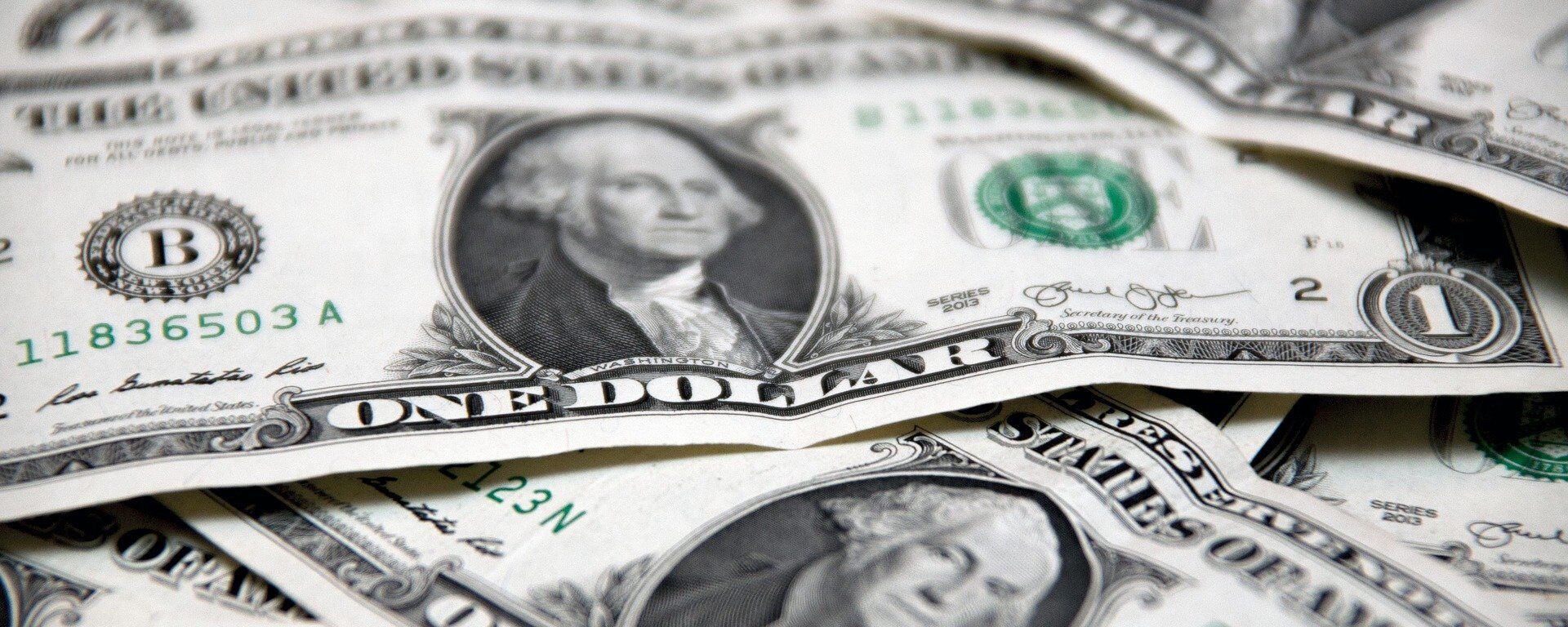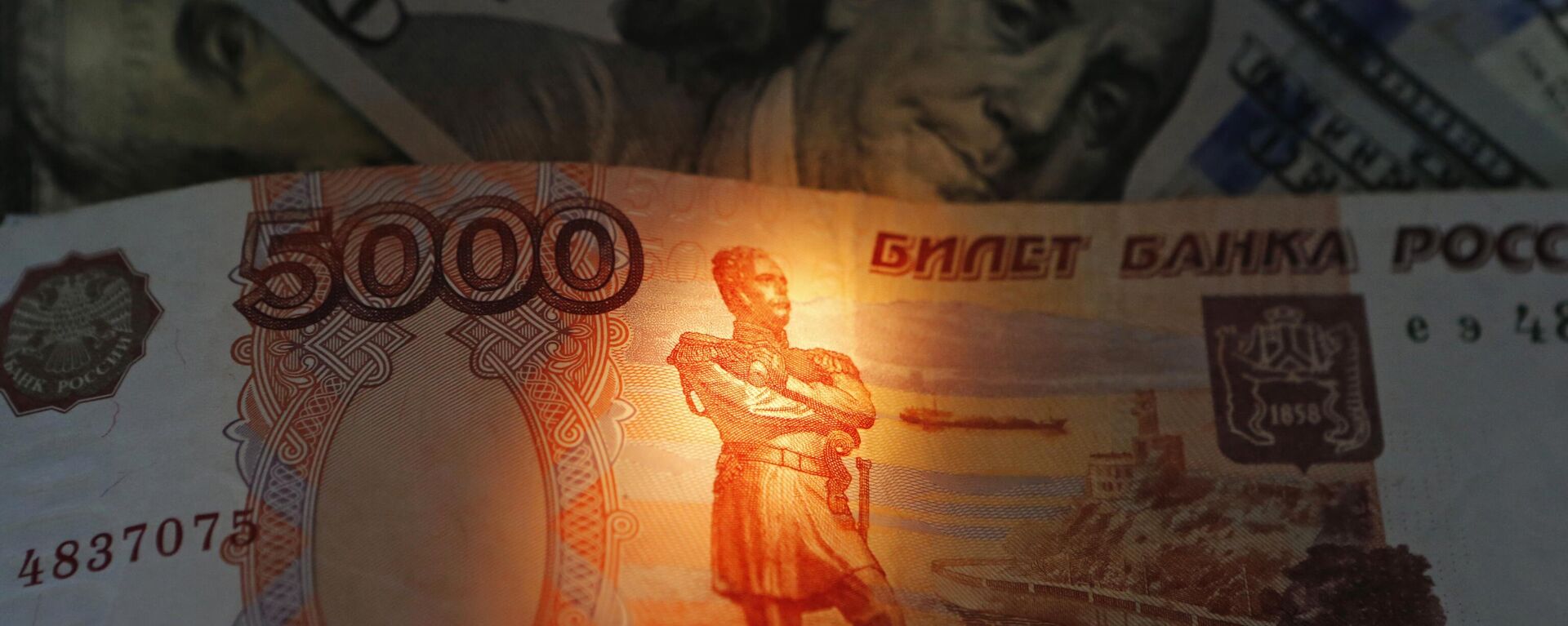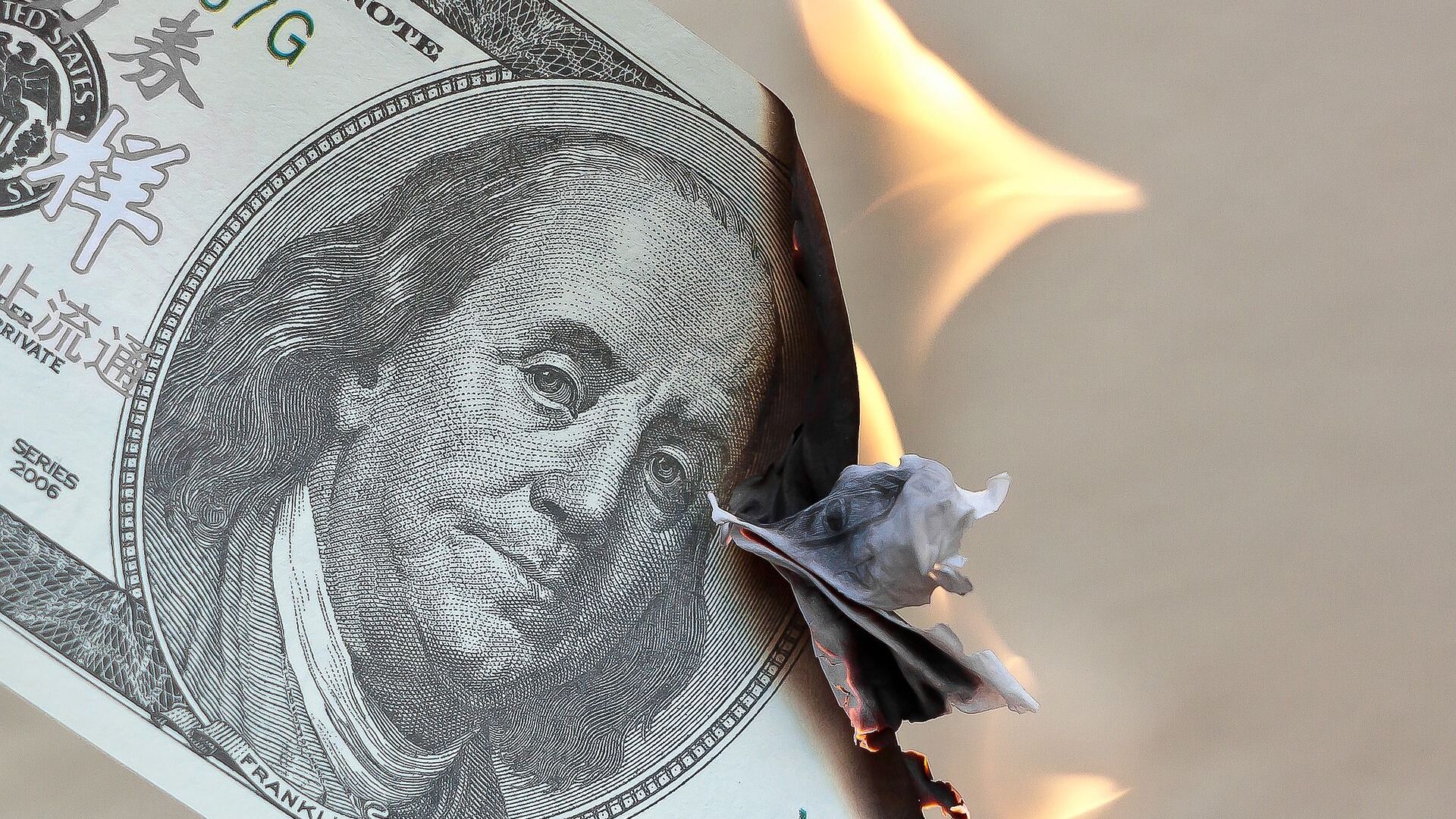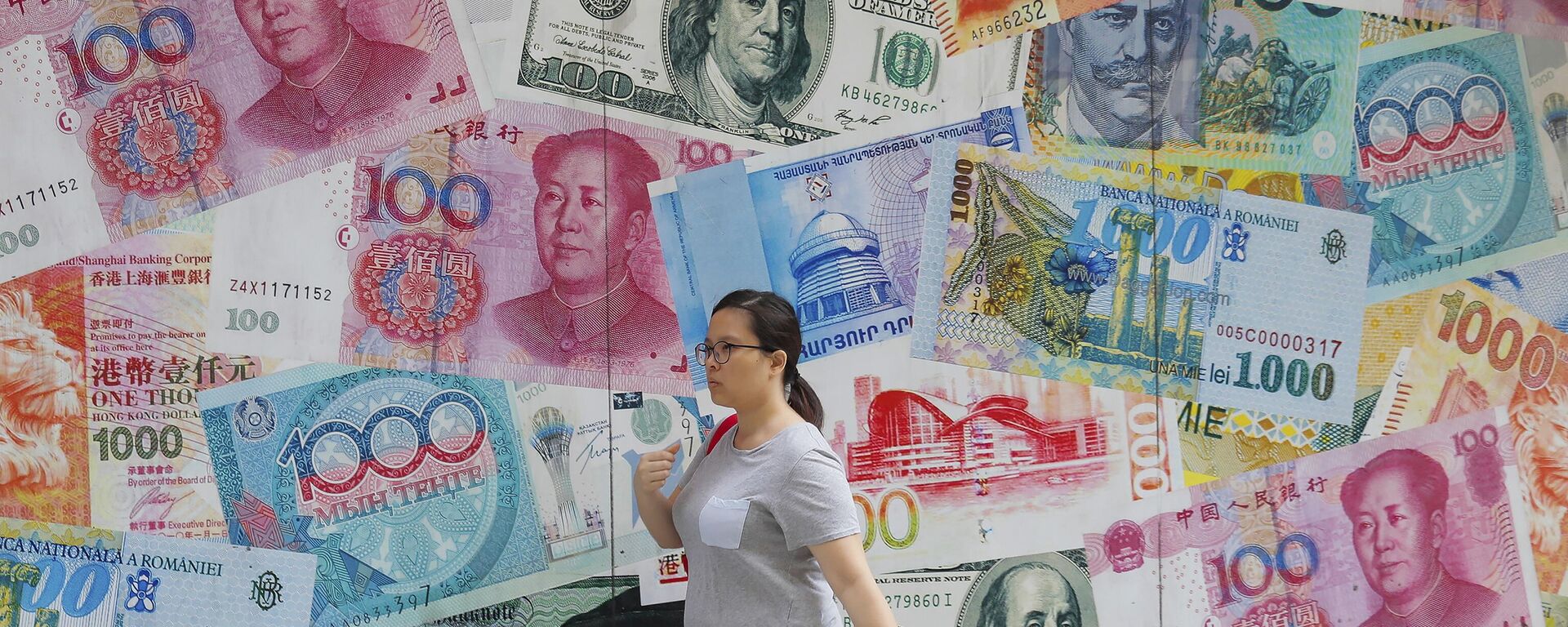https://sputnikglobe.com/20240105/one-in-three-un-countries-are-opting-for-de-dollarization-1115987761.html
One in Three UN Countries Are Opting For De-Dollarization
One in Three UN Countries Are Opting For De-Dollarization
Sputnik International
Dedollarization pertains to the process of reducing the US dollar's hegemony in global trade and financial operations by shifting to alternative exchange methods, including national currencies and domestic payment systems.
2024-01-05T12:11+0000
2024-01-05T12:11+0000
2024-01-05T12:11+0000
economy
us
russia
brazil
south africa
vietnam
dollar
https://cdn1.img.sputnikglobe.com/img/107963/97/1079639749_0:146:1920:1226_1920x0_80_0_0_7da62549fd722a235b7b615c464dee32.jpg
A third of UN member states have already opted for de-dollarization and decided to rely on national currencies to conduct payments, Sputnik's analysis has found.According to the study, the most decisive calls to scrap the greenback and replace it with national currencies came from politicians whose countries are members of major regional organizations such as the Association of Southeast Asian Nations (ASEAN) and BRICS, which originally сomprised Brazil, Russia, India, China, and South Africa - but was expanded to include a host of other nations on January 1.He was in turn echoed by Kenyan President William Ruto, who urged local leaders to take the first steps towards abandoning the dollar and make transactions through the pan-African payment system instead.Sputnik's investigation indicated that many countries have already realized the fact that the dollar poses a threat not only as a means of payment, but also as an instrument of savings, so the concept of de-dollarization should be considered more broadly.Israel, for instance, earlier announced that it would reduce the dollar's share in the country’s foreign exchange reserves in favor of the yuan. Some countries are making more targeted efforts to reduce their population's dependence on foreign currencies, including Vietnam, which has banned long-term foreign currency deposits.Maxim Osadchy, head of the analytical department of the Moscow-based BKF Bank, told Sputnik that de-dollarization is one of the consequences of increasing fragmentation of the global economy and the transition to a multipolar world.This followed Russia's Minister for Integration and Macroeconomics of the Eurasian Economic Commission Sergey Glazyev telling Sputnik that as the potentially limitless range of cooperation between the Eurasian Economic Union (EEU) and ASEAN aspires to reach new levels, it is especially important to accelerate the transition to national currencies.The dollar suffered a 2.7 percent decline against other major global currencies during 2023, the greenback’s worst-performing year since the global economic downturn associated with the coronavirus in 2020.
https://sputnikglobe.com/20230914/dedollarization-accelerating-within-brics-across-globe---netley-group-1113359503.html
https://sputnikglobe.com/20230911/rubles-share-in-russias-exports-tops-50-percent-as-dedollarization-gains-momentum-1113276778.html
https://sputnikglobe.com/20230701/dedollarization-accelerates-as-argentina-makes-imf-payment-using-yuan-1111605999.html
russia
brazil
south africa
vietnam
Sputnik International
feedback@sputniknews.com
+74956456601
MIA „Rosiya Segodnya“
2024
Oleg Burunov
https://cdn1.img.sputnikglobe.com/img/07e4/09/0b/1080424846_0:0:2048:2048_100x100_80_0_0_3d7b461f8a98586fa3fe739930816aea.jpg
Oleg Burunov
https://cdn1.img.sputnikglobe.com/img/07e4/09/0b/1080424846_0:0:2048:2048_100x100_80_0_0_3d7b461f8a98586fa3fe739930816aea.jpg
News
en_EN
Sputnik International
feedback@sputniknews.com
+74956456601
MIA „Rosiya Segodnya“
Sputnik International
feedback@sputniknews.com
+74956456601
MIA „Rosiya Segodnya“
Oleg Burunov
https://cdn1.img.sputnikglobe.com/img/07e4/09/0b/1080424846_0:0:2048:2048_100x100_80_0_0_3d7b461f8a98586fa3fe739930816aea.jpg
calls to scrap the us dollar, brics' drive to abandon the dollar for national transactions, un members' push for dedollarization
calls to scrap the us dollar, brics' drive to abandon the dollar for national transactions, un members' push for dedollarization
One in Three UN Countries Are Opting For De-Dollarization
De-dollarization is the process of reducing the US dollar's hegemony in global trade and financial operations by shifting to alternative exchange methods such as national currencies and domestic payment systems, as well as transferring currency reserves.
A third of UN member states have already opted for de-dollarization and decided to rely on
national currencies to conduct payments, Sputnik's analysis has found.
The analysis, which looked into statements made by officials from 193 UN countries in international and Russian media, showed that representatives of at least 68 UN nations openly supported the process of de-dollarization or stated that they were taking measures to this effect.

14 September 2023, 04:01 GMT
According to the study, the most decisive calls to scrap the greenback and replace it with national currencies came from politicians whose countries are members of major regional organizations such as
the Association of Southeast Asian Nations (ASEAN) and BRICS, which originally сomprised Brazil, Russia, India, China, and South Africa - but was expanded to include a host of other nations on January 1.
For his part, Brazilian President Luiz Inacio Lula da Silva has repeatedly proposed the creation of an alternative currency to the dollar for payments within BRICS. The view was shared by South African Finance Minister Enoch Godongwana, who called for enhanced lending in national currencies.
He was in turn echoed by Kenyan President William Ruto, who urged local leaders to take the first
steps towards abandoning the dollar and make transactions through the pan-African payment system instead.
Sputnik's investigation indicated that many countries have already realized the fact that the dollar poses a threat not only as a means of payment, but also as an instrument of savings, so the concept of de-dollarization should be considered more broadly.

11 September 2023, 12:53 GMT
Israel, for instance, earlier announced that it would reduce the dollar's share in the country’s foreign exchange reserves in favor of the yuan. Some countries are making more targeted efforts to reduce their population's dependence on foreign currencies, including Vietnam, which has banned long-term foreign currency deposits.
Maxim Osadchy, head of the analytical department of the Moscow-based BKF Bank, told Sputnik that de-dollarization is one of the consequences of increasing fragmentation of the global economy and the transition to a multipolar world.
"De-dollarization intensified due to the anti-Russian sanctions, which clearly showed the risks of the national economy’s dependence on the US currency. De-dollarization reduces the demand for the greenback and, as a result, contributes to its devaluation," Osadchy pointed out.
This followed Russia's Minister for Integration and Macroeconomics of the Eurasian Economic Commission Sergey Glazyev telling Sputnik that as the potentially limitless range of cooperation between the Eurasian Economic Union (EEU) and ASEAN aspires to reach new levels, it is especially important to accelerate the transition to national currencies.
"This is an imperative for us; we can no longer trade in Western currencies. But it takes time for our partners to fully appreciate the benefits and importance of a transition to national currencies," the minister stressed.
The dollar suffered a 2.7 percent decline against other major global currencies during 2023, the greenback’s worst-performing year since the global economic downturn associated with the coronavirus in 2020.








